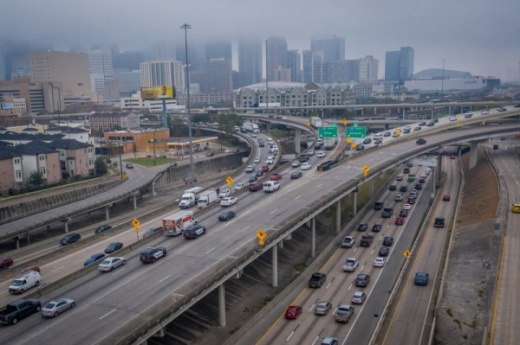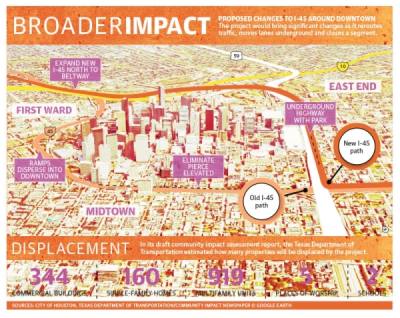In 2020, the Texas Department of Transportation will reach several critical milestones in a $7 billion project labeled by transportation officials as transformative and by community activists as destructive.
The North Highway Improvement Project, which includes a proposal to reroute I-45 to follow I-69 east of downtown rather than its existing path through Midtown, was introduced in 2004 and revised as recently as December after criticism grew from activists, neighborhoods, and city officials.
“This is the biggest decision that Houston will make in 2020. In fact, it may be the biggest project in all of the 2020s,” said Michael Skelly, founder of the Make I-45 Better Coalition, which advocates for reforms to the plan.
TxDOT is accepting comments on the latest design, which was updated in December, until Feb. 7. In the spring, the agency will release a final environmental impact statement and record of decision, one of the last steps before work may begin. Some city officials, however, are pushing for changes to the project before it transforms how both commuters and Inner Loop residents access downtown.
Project proposal
Transportation officials cite growing congestion—fueled by population growth and increasing commuter traffic from Houston’s suburbs—and aging infrastructure as vital issues the state needs to address through the project. Activists and city leaders however, are raising concerns about air quality; sound pollution; displacement, particularly in communities of color; and flooding.
A study published in 2019 from the Texas A&M Transportation Institute shows the average Houston commuter spent 75 hours in traffic in 2017—22 more hours than in 2007. In its annual survey, Rice University’s Kinder Institute for Urban Research found that traffic beat flooding to top the list of Houstonians’ biggest concerns.
To address these, TxDOT plans to expand the highway and add high-occupancy vehicle lanes, through much of I-45 in the Northside.
Where I-45 approaches downtown from southeast Houston, it will curve eastward to follow I-69 along east downtown instead of continuing west through Midtown. It will then turn north where it will tie into its existing path through north Houston.
This realignment means the Pierce Elevated—the stretch of I-45 separating downtown and Midtown—would be decommissioned and potentially used as an elevated park space if private contributors step in, according to TxDOT. A portion of the highway will also be rebuilt underground between downtown and east downtown. The caps over this section and another section in the Near Northside, provide opportunities for more parks.
The potential parks are one reason Mayor Sylvester Turner said he wants improvements to the plan but does not want to stop it all together.
“If I-45 can be designed and constructed in such a fashion that the freeway disappears and you have more green space, more park space, then that’s a tremendous plus in the way that it mitigates the risk of flooding and reduces greenhouse gases. From an environmental point of view, those are big pluses,” Turner told reporters.
Opposition and opportunity
Residents of several affected neighborhoods have sounded alarm bells about unintended consequences.
Just north of Loop 610 on the west side of I-45, legal representatives of the Independence Heights Redevelopment Council and its director, Tanya Debose, submitted 58 pages of formal comments to TxDOT criticizing the exclusion of the neighborhood from the department’s historical resources impact report despite its history as the first independent incorporated black city in Texas.
In response, TxDOT officials said the department plans to assist in relocating residents and developing affordable housing in Independence Heights, Near Northside, Greater Fifth Ward and the Greater Third Ward.
Not only would the widening put more schools and homes close to the highway and displace residents and businesses, the comments allege it could also increase flooding in the same way that the construction of the Loop caused an upstream bottleneck in the neighborhood.
“We have to know the downstream effects of every decision that we make in every construction project from now on. Flooding effects everybody,” said Molly Cook, a member of activist group Stop I-45.
However, Turner said the roadway, which dates back to the 1960s, needs upgrades to limit its current flooding and safety issues.
Another Northside resident, Stop I-45 founder Susan Onstott Graham, said she was surprised by the amount of support her group has received but worries it only represents a portion of those who would oppose the project if they knew more.
“Not everyone has a Tanya [Debose] to stick up for them,” she said.
Proponents of the plan said decommissioning the Pierce Elevated will open up the boundary between downtown and Midtown and promote new development. Paul Benz, the president of the First Ward Civic Association, said the connectivity provided from the project may benefit commuters more than Houston residents.
“Right now we can bypass hitting Memorial Drive, Allen Parkway and really a lot of downtown. We’re flying over that but now they want to drag us through,” he said.
Onstatt Graham said she feels similarly in the Northside.
“I will be basically isolated in my own neighborhood if they move forward with this the way they want to,” she said.
Aware of these concerns, Turner said he voices them in discussions with TxDOT officials.
“We don’t want to destroy or work against any communities like Independence Heights and communities on the West and the East sides,” Turner said. “I’ve said repeatedly that the existing footprint is too large.”
Next steps
TxDOT will issue a record of decision and could receive final approval from the Texas Commission of Transportation by as early as summer 2020 and then begin the design-build phase of the downtown portion, TxDOT officials said.
“TxDOT is either going to listen to those recommendations or they’re not. History tells us they don’t,” Skelly said while comparing the project to the expansion of the Katy Freeway.
In a letter to the Houston-Galveston Area Council, which will vote on whether to contribute additional funds to the project this spring, Turner said that he would not support that funding if the city’s needs are not met. Regarding the project as a whole, however, he said he is optimistic.
“It is still very much a work in progress, but to just say no for the sake of saying no is not in the best interest of the people in the city of Houston,” he said.







